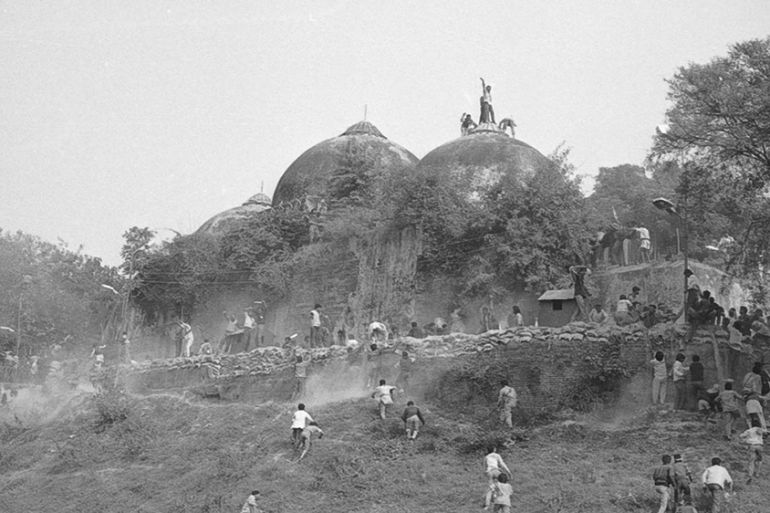Timeline: Babri mosque-Ram temple case
The site at which Babri Mosque once stood is fiercely contested by Hindus and Muslims.

India’s top court has ruled on the ownership of a centuries-old religious site claimed by both Hindus and Muslims.
The Supreme Court on Saturday ruled that the site in Ayodhya in northern India, where Hindu mobs destroyed a 460-year-old mosque in 1992, must be handed over to a trust to oversee the construction of a Hindu temple, subject to conditions. A separate piece of land in Ayodhya would be given over to Muslim groups.
Keep reading
list of 4 itemsMuslim pupil loses UK court bid over Michaela school prayer rituals ban
Photos: Sikhs celebrate harvest festival of Baisakhi, marking new year
Masses gather for Eid celebrations in India
The demolition of the Babri Mosque triggered some of the deadliest religious riots the country had seen since its independence in 1947.
Muslims say they prayed at the medieval-era mosque for centuries while Hindus say their deity Ram was born at the site where the mosque stood before December 6, 1992.
Here is a look at the key events surrounding the dispute.
1528
Mosque construction
Babri Mosque is built under the rule of the first Mughal king, Babur.
December 23, 1949
Mosque a ‘disputed property’
As idols of the Hindu deity Rama are placed inside the mosque, according to police reports, the government declares Babri Mosque a “disputed property” and its gates are locked. No Muslim prayers offered at the mosque since then.
1950-61
Civil suits filed
Four civil suits filed in the court ranging from the rights to perform Hindu rituals at the site to a Muslim group seeking declaration and possession of the site.
1984
Hindu temple committee
A committee is formed by Hindu groups, including the Vishwa Hindu Parishad (VHP), to spearhead the construction of a Hindu temple.
1990
Ram temple
The leader of the right-wing Bharatiya Janata Party (BJP), LK Advani, leads a nationwide campaign to build a Ram temple in the place of the mosque.
December 6, 1992
Hindu nationalist mob tears down Babri Mosque
A Hindu mob reduces the mosque to rubble. Riots break out across the country leading to the killing of about 2,000 people.
December 16, 1992
Liberhan Commission
Ten days after the demolition of the mosque, the central government forms the Liberhan Commission to probe the incident.
2003
Archaeological survey
Archaeologists begin a court-directed survey to determine whether a Hindu temple existed at the site. The survey says there is evidence of a temple beneath the mosque, but many archaeologists and Muslims dispute the findings.
June 2009
Liberhan Commission report
The Liberhan Commission submits its report, with senior BJP leaders, including Advani, facing trial for the demolition of the mosque.
September 2010
Site to be ‘shared’
Three judges of the Allahabad High Court rule that the disputed site should be shared by Hindus and Muslims. The court said two-thirds of the 2.77-acre (1.12-hectares) site belongs to Hindu groups (Nirmohi Akhara sect and Ramlalla Virajman) and the rest to the Muslim group (Sunni Central Wakf Board, UP).
May 2011
Ruling suspended
India’s Supreme Court suspends the High Court ruling following appeals by Hindu and Muslim groups.
March 21, 2017
Out-of-court settlement
The chief justice of India suggests out-of-court settlement between Hindus and the Muslims.
April 19, 2017
Conspiracy charges
The Supreme Court revives conspiracy charges against top ruling party leaders Advani, Murli Manohar Joshi and 13 others in the mosque demolition case.
December 5, 2017
Supreme Court hearing
The top court hears 13 appeals in the dispute.
September 27, 2018
Three-judge bench
Supreme Court declines to refer the case to a five-judge Constitution bench. Case to be heard by a newly constituted three-judge bench on October 29.
January 25, 2019
Five-judge bench to hear case
Chief Justice of India (CJI) Ranjan Gogoi sets up a five-judge bench to hear the case overruling an earlier order by then-CJI Dipak Misra to set up a three-judge bench. The new bench comprised Chief Justice Gogoi and Justices SA Bobde, DY Chandrachud, Ashok Bhushan and SA Nazeer.
March 8, 2019
Mediation panel set up
The top court sets up a mediation panel headed by former Supreme Court judge FM Ibrahim Kalifulla to reach an out-of-court settlement.
August 2, 2019
Mediation failed
The Supreme Court says mediation efforts have failed.
August 6, 2019
Day-to-day hearing
Supreme Court commences day-to-day hearing on the Ayodhya land dispute.
October 16, 2019
Hearing concluded, order reserved
The Supreme Court concludes hearing; the five-judge bench reserves the judgement.
November 9, 2019
The Supreme Court rules that the land must be handed over to a trust to oversee the construction of a Hindu temple, subject to conditions.
A separate piece of land in Ayodhya would be given over to Muslim groups.